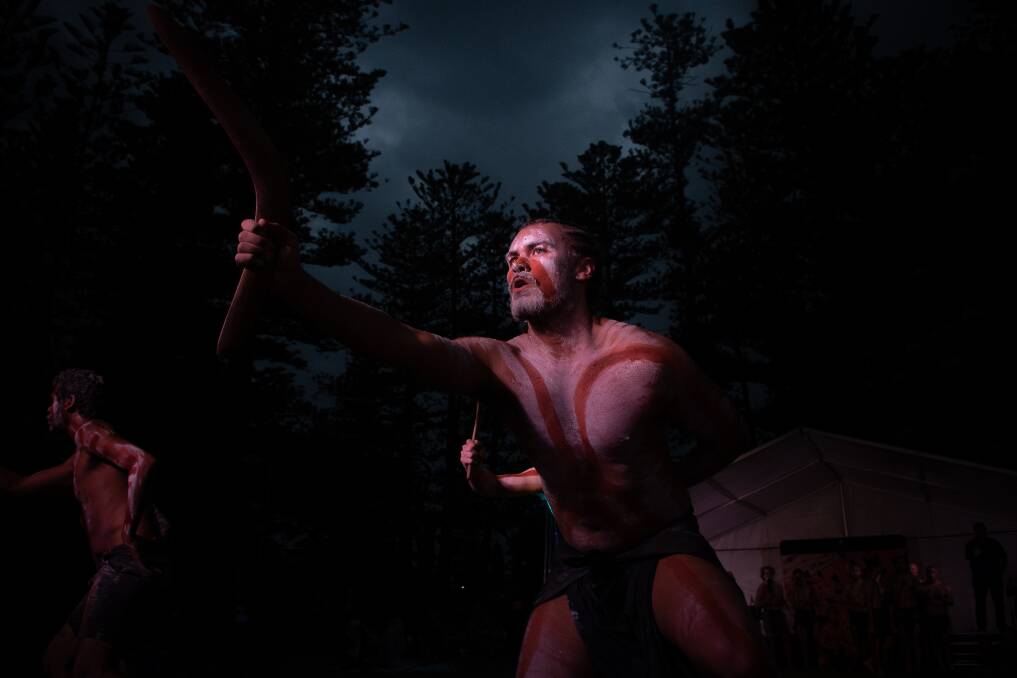A community vigil in recognition of Indigenous culture in the Lower Hunter and around the country packed the natural amphitheatre of King Edward Park Tuesday evening, as speakers in turns mourned the devastating impact of colonialism on their heritage and celebrated the resilience and diversity of ancient and living culture.
The event, inspired by a similar vigil held at Sydney annually for the past four years, was hosted by the Univeristy of Newcastle in partnership with Awabakal Ltd and supported by Newcastle council, and was billed as a "time for listening and quiet reflection through the sharing of stories, knowledge and culture".
More than 1800 people had registered online to attend the event, organisers said, as countless families gathered on the lawn to hear from professors of the university, community members and students, and take in performance, stories, and music on the eve of January 26.

Emeritus Professor John Maynard used his keynote address to describe traditional farming and fishing practiced by the Awabakal and Worimi peoples of the Lower Hunter and Lake Macquarie area, while professor Bob Morgan spoke of the need for cultural unity through an "honourable treaty" that recognised the resilience of Indigenous cultures while "correcting historical and present wrongs".
As the country emerged from the ravages of the coronavirus pandemic, Professor Morgan said he had hope for a "new normal" and called for the community to overcome the "impediments to true and lasting reconciliation" through an "honest engagement to truth telling".
"An honourable treaty must be negotiated if our country is to live up to its promise," he said, "All of us as Australians should stand behind that and demand it of our politicians at every level of government."
Bundjulung and Worimi Saltwater woman Phoebe McIlwriath - a Law and Business student - closed the event with an appeal for the community to understand the complex and fraught tensions that accompany Australia Day, describing January 26 as both a day of mourning for her family and her culture but also one of recognition of the resilience of Indigenous people.
"January 26 can look like going to a protest march in the morning," she said. "You sit in contemplation with your people and you look at the work that has to be done.
"And then in the afternoon, you go to the beach. You walk down in your family unit, in your Aboriginal flag t-shirts - a beacon of your citizenship - and a nice hot seafood basket from the kiosk under your arm, and you laugh in big, Black laughter because you're here. You're still here.
"This January 26, I will honour what we have lost, but I will also honour the fact that we are still here, and we will always be here."
Nathan Towney, the university's Pro Vice-Chancellor Indigenous Strategy and Leadership, said the city's inaugural "Ngarrama" event - which translates to "sit, listen and know" - was a powerful opportunity for the Newcastle community to come together to reflect on traditional life before 1788 and to celebrate the richness of First Nations culture.
"The success of the vigil in Sydney has shown that there is a real appetite in the community to reconcile with our nation's past through reflection, truth telling and learning. We are proud to bring a similar opportunity to Newcastle," he said.
Univeristy Vice-Chancellor, Professor Alex Zelinsky, said the University of Newcastle was immensely proud of its longstanding commitment to Indigenous higher education, innovation and engagement.
"As a leader within the Newcastle community we are committed to meaningful engagement and community collaboration for reconciliation," Professor Zelinsky said in a statement prior to the event. "Our regions are home to the fastest growing population of Aboriginal and Torres Strait Islander peoples in Australia.
"Culture is strong and there is a thirst from non-Indigenous parts of our community to connect with, and learn from, Aboriginal and Torres Strait Islander peoples."







